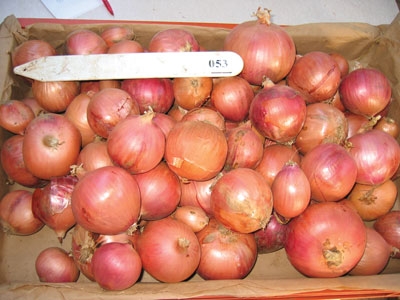
Features
Production
Vegetables
Research helps breeders really know their onions
November 30, 1999 By Fruit & Vegetable
 Dr. Andrew Taylor of the Warwick Crop Centre at the University of Warwick has been working on resistance to Fusarium oxysporum in onions. Photos from the University of Warwick
Dr. Andrew Taylor of the Warwick Crop Centre at the University of Warwick has been working on resistance to Fusarium oxysporum in onions. Photos from the University of Warwick Research led by the Warwick Crop Centre in the School of Life Sciences at the University of Warwick, Coventry, U.K., has developed a unique collection of information about the disease resistance of 96 of the world’s onion varieties.
This information will be a crucial resource for commercial growers and seed producers trying to combat one of the most difficult diseases affecting onion crops. This work may also have benefits in terms of reduced fertilizer consumption and enhanced drought tolerance.
The research on onions is being funded by Defra (the Department for Environment, Food and Rural Affairs) and is being carried out by Dr. Andrew Taylor, a research fellow in the University of Warwick’s School of Life Sciences. He has tested and recorded the key traits of 96 varieties of onion from Europe, Australia, New Zealand, Africa, India, the U.S. and Japan. The data provide information that will be crucial to growers seeking to use or create onion varieties that can resist Fusarium oxysporum (which causes basal rot in onions), and that respond well to Arbuscular Mycorrhizal Fungi – beneficial fungi. An improved interaction with these fungi assists nutrient uptake in onions, potentially decreasing the amount of fertilizer required. These fungi can have other beneficial effects such as increased disease resistance and drought tolerance.
This research will not only help individual commercial growers and seed producers but will also contribute significantly to global food security, particularly in situations where rising temperatures are an issue. Enhanced resistance to Fusarium oxysporum will be of importance in dealing with rising temperatures as basal rot is more active and acute in warmer conditions.
Dr. Taylor presented his work during the Onion Global 2011 conference, held in Deidesheim, Germany, in mid-August. The work forms part of a larger Defra funded study at the University of Warwick entitled the Vegetable Genetic Improvement Network (VeGIN) looking at understanding and cataloguing useful traits in a range of vegetables that seed producers can use to inform their breeding strategies.
“We have developed a unique onion diversity set from material sourced from across the globe, said Dr. Taylor. “We now have a extremely useful library of the variation in traits, including resistance to Fusarium oxysporum, response to Arbuscular Mycorrhizal Fungi and seed/seedling vigour, all of which will be extremely useful to growers and seed producers dealing with changing conditions and threats to onion crops.”
“I am delighted that VeGIN is already providing results that can have a direct impact on the global efforts to enhance food security,” said Dr. Rosemary Collier, Warwick Crop Centre director. “This is just the first of what will be a range of outputs from this Defra-funded work at the Warwick Crop Centre that will be of significant benefit to growers across the planet.”
Print this page